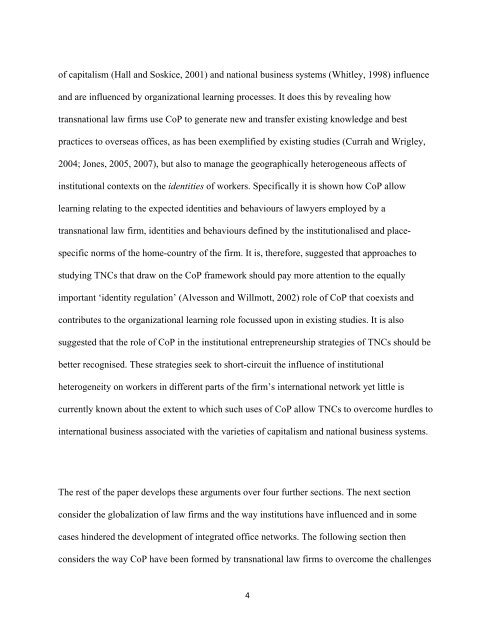Learning to be a lawyer in transnational law firms: communities of ...
Learning to be a lawyer in transnational law firms: communities of ...
Learning to be a lawyer in transnational law firms: communities of ...
You also want an ePaper? Increase the reach of your titles
YUMPU automatically turns print PDFs into web optimized ePapers that Google loves.
<strong>of</strong> capitalism (Hall and Soskice, 2001) and national bus<strong>in</strong>ess systems (Whitley, 1998) <strong>in</strong>fluence<br />
and are <strong>in</strong>fluenced by organizational learn<strong>in</strong>g processes. It does this by reveal<strong>in</strong>g how<br />
<strong>transnational</strong> <strong>law</strong> <strong>firms</strong> use CoP <strong>to</strong> generate new and transfer exist<strong>in</strong>g knowledge and <strong>be</strong>st<br />
practices <strong>to</strong> overseas <strong>of</strong>fices, as has <strong>be</strong>en exemplified by exist<strong>in</strong>g studies (Currah and Wrigley,<br />
2004; Jones, 2005, 2007), but also <strong>to</strong> manage the geographically heterogeneous affects <strong>of</strong><br />
<strong>in</strong>stitutional contexts on the identities <strong>of</strong> workers. Specifically it is shown how CoP allow<br />
learn<strong>in</strong>g relat<strong>in</strong>g <strong>to</strong> the expected identities and <strong>be</strong>haviours <strong>of</strong> <strong><strong>law</strong>yer</strong>s employed by a<br />
<strong>transnational</strong> <strong>law</strong> firm, identities and <strong>be</strong>haviours def<strong>in</strong>ed by the <strong>in</strong>stitutionalised and placespecific<br />
norms <strong>of</strong> the home-country <strong>of</strong> the firm. It is, therefore, suggested that approaches <strong>to</strong><br />
study<strong>in</strong>g TNCs that draw on the CoP framework should pay more attention <strong>to</strong> the equally<br />
important ‘identity regulation’ (Alvesson and Willmott, 2002) role <strong>of</strong> CoP that coexists and<br />
contributes <strong>to</strong> the organizational learn<strong>in</strong>g role focussed upon <strong>in</strong> exist<strong>in</strong>g studies. It is also<br />
suggested that the role <strong>of</strong> CoP <strong>in</strong> the <strong>in</strong>stitutional entrepreneurship strategies <strong>of</strong> TNCs should <strong>be</strong><br />
<strong>be</strong>tter recognised. These strategies seek <strong>to</strong> short-circuit the <strong>in</strong>fluence <strong>of</strong> <strong>in</strong>stitutional<br />
heterogeneity on workers <strong>in</strong> different parts <strong>of</strong> the firm’s <strong>in</strong>ternational network yet little is<br />
currently known about the extent <strong>to</strong> which such uses <strong>of</strong> CoP allow TNCs <strong>to</strong> overcome hurdles <strong>to</strong><br />
<strong>in</strong>ternational bus<strong>in</strong>ess associated with the varieties <strong>of</strong> capitalism and national bus<strong>in</strong>ess systems.<br />
The rest <strong>of</strong> the paper develops these arguments over four further sections. The next section<br />
consider the globalization <strong>of</strong> <strong>law</strong> <strong>firms</strong> and the way <strong>in</strong>stitutions have <strong>in</strong>fluenced and <strong>in</strong> some<br />
cases h<strong>in</strong>dered the development <strong>of</strong> <strong>in</strong>tegrated <strong>of</strong>fice networks. The follow<strong>in</strong>g section then<br />
considers the way CoP have <strong>be</strong>en formed by <strong>transnational</strong> <strong>law</strong> <strong>firms</strong> <strong>to</strong> overcome the challenges<br />
4
















